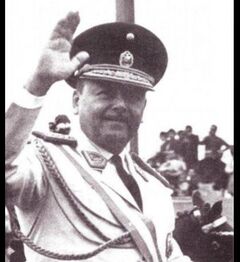Carmòn Solévereu: Difference between revisions
ContraViper (talk | contribs) No edit summary |
ContraViper (talk | contribs) |
||
| Line 38: | Line 38: | ||
==Early Life== | ==Early Life== | ||
===Communist Theory=== | ===Communist Theory=== | ||
In regard to the failure of prior movements to bring about organic communist or socialist revolution in Inyursta, Solévereu blamed three major elements of Inyurstan culture: 1) private land ownership; explicitly the "[[Granjèchampé]]" system where most rural property was plots owned by small family units and held over generations as both business and heirloom (contrasted with the latifundia system of neighboring Cuscatlan); 2) the church; primarily the [[Néopròtestantaire]] church which preached Jesus as higher than any earthly authority, but also the Catholic church which he viewed as "in the pocket of the bourgeoises"; 3) [PLACEHOLDER] | |||
Following his coup, Solévereu began a process he called "'''Aggressive Deconstruction'''"; wherein top-down programs were used to directly control and counter these cultural elements. Solévereu and his contemporaries believed that the groundwork for a true socialist people's republic could only be laid when the existing "cultural infrastructure" had been removed. | |||
==As First Director== | ==As First Director== | ||
==Death== | ==Death== | ||
==Legacy== | ==Legacy== | ||
===Ideological Authenticity=== | ===Ideological Authenticity=== | ||
Revision as of 19:33, 26 April 2022
Carmòn Iglé Solévereu de Pêsche was an Inyurstan dictator who ruled from 1956 until his death in 1968, though due to the Inyurstan Civil War his territorial reign was progressively diminished until his demise at the hands of counter-revolutionary forces.
Early Life
Communist Theory
In regard to the failure of prior movements to bring about organic communist or socialist revolution in Inyursta, Solévereu blamed three major elements of Inyurstan culture: 1) private land ownership; explicitly the "Granjèchampé" system where most rural property was plots owned by small family units and held over generations as both business and heirloom (contrasted with the latifundia system of neighboring Cuscatlan); 2) the church; primarily the Néopròtestantaire church which preached Jesus as higher than any earthly authority, but also the Catholic church which he viewed as "in the pocket of the bourgeoises"; 3) [PLACEHOLDER]
Following his coup, Solévereu began a process he called "Aggressive Deconstruction"; wherein top-down programs were used to directly control and counter these cultural elements. Solévereu and his contemporaries believed that the groundwork for a true socialist people's republic could only be laid when the existing "cultural infrastructure" had been removed.
